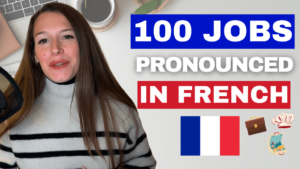Transcript
Many French people who don't use it are annoyed by those who do and put it everywhere. Shall we go or not? If you want to speak like a Frenchman, you have to use this expression "j'avoue".
Hello everyone, welcome to another French lesson. Together, we're going to look at four expressions that have almost become language tics among some, and indeed many, French people. This will help you to better understand exchanges between French people, whether in the street or on TV, in series or films.
🚀 Transform your understanding of French IN 15 MINUTES A DAY
60 dialogues to boost your understanding of French 🇫🇷
Let's start with an expression that's used a lot by the French. This expression is "j'avoue". If you want to speak like a Frenchman, you have to use this expression "j'avoue". Of course, in a colloquial register. J'avoue" is used instead of "je suis d'accord". The first meaning of the verb avouer is to tell the truth. For example, we'd say the murderer confessed to the crime. Or my little brother has confessed to eating all the cookies.
So we end up telling the truth. You admit you've done something. But in everyday language, when someone says "I confess", it just means they agree. It means you're right, I agree with you. We're not going out if it's raining. I admit, you're right. You must be really hungry. You didn't eat any breakfast. I admit, I didn't even realize it. You're not going to wear red pants with a pink sweater, are you? I'll admit, it doesn't really go together.
The second expression? I don't like it very much. I find it a bit annoying, but you hear it in the mouths of a lot of French people. It's "ou bien". It's an expression that doesn't add much value to a sentence. I'll give you a few examples and then explain. "On y va ou bien?" "Do you manage to get your coat on or not?". Or it's an expression we use in French to show impatience. It starts with annoyance. Tu réussis à mettre ton manteau ou bien? The implication is that the person is a little slow, having trouble getting the zipper to close.
Or if you say to someone, "Are we going or not?" You mean that he's a bit slow, that he should hurry up a bit. In itself, in terms of meaning, it doesn't add any value, but you add this or else a little to show your annoyance, your impatience.
Contrary to what you might think, because obviously, in French, the "ou" is used to propose an alternative. Do you want a tea or a coffee? Here, of course, that's not the case.
The third expression very often used orally by the French is "en fait". The expression "in fact" is used very often at the drop of a hat, and once again doesn't add much value to a sentence. You see, he's actually quite nice. You're right, there are no more trains, I'll take the car. This expression means "in the end", but it's not very useful. For example, I could have said "You see, he's very nice, you see, he's nice" or "You're right, there's no more train, I'll take my car".
It's a slightly superfluous expression, but one that adds rhythm to a conversation or an exchange. "In fact, it gives the impression of linking different parts of the sentence.
And finally, the last expression we're going to look at today is "du coup". A lot of French people who don't use it are annoyed by those who do and sometimes use it. Recently, I saw a board on social networks that mocked people who used "du coup". In all their sentences, there was a column with "vieux français" and "français en 2022" written in it.
So, for example, instead of using ainsi, donc, dès lors, c'est pourquoi, par conséquent, finalement, if I understand correctly, there's a whole list of words that we'll simply replace with "du coup". So this expression has become a real language tic. Sometimes, in the same sentence, you can hear a French person use it three times. So, if we go to the sea, we'll have to come back home to change because we won't be going to the restaurant in our swimsuit.
Of course, here I've used it in an exaggerated way. Sometimes it's just used, as I was saying, as a synonym for finally. For example, I might say "did you get a burger or a pizza in the end?" I mean in the end, did you choose a burger or a pizza?
That's it for today. If you liked this video, put a "like" and of course, subscribe.
I'll see you next week.








